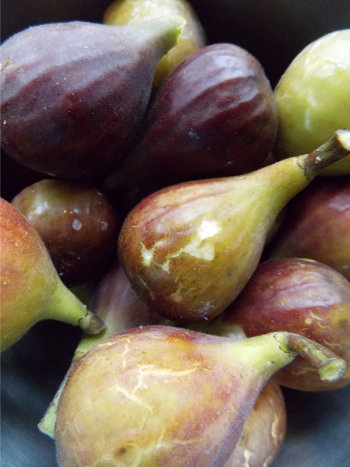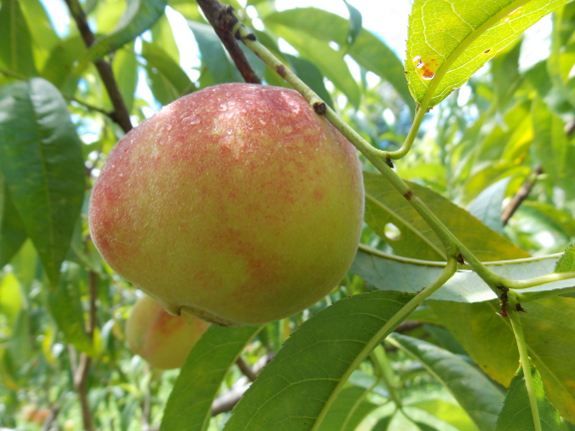
What fruit should a weekend homesteader plant?
 A few weeks ago, I caught
a stomach bug and spent a few days with absolutely no interest in
food. On our farm, I manage the larder and meals while Mark
does the dishes and grocery shopping, so without me on the job,
several figs and raspberries rotted on the vine. The waste
was extremely minimal, but it got me thinking about one of the
biggest hurdles non-full-time homesteaders face --- putting in the
daily time to make sure they pluck produce at its peak. That
thought set me pondering which fruit types are best and worst for
the true weekend
homesteader who only has two days a week to visit her
garden.
A few weeks ago, I caught
a stomach bug and spent a few days with absolutely no interest in
food. On our farm, I manage the larder and meals while Mark
does the dishes and grocery shopping, so without me on the job,
several figs and raspberries rotted on the vine. The waste
was extremely minimal, but it got me thinking about one of the
biggest hurdles non-full-time homesteaders face --- putting in the
daily time to make sure they pluck produce at its peak. That
thought set me pondering which fruit types are best and worst for
the true weekend
homesteader who only has two days a week to visit her
garden.
Even though I think
of them as productive and low work, I realized that most berries
wouldn't be appropriate for the true weekend homesteader.
Raspberries tend to mold in our climate if you go more than a day
(possibly two if it's sunny) without picking, and I discovered
that ripe figs (although not a true berry) won't last much
longer. Strawberries are probably in the fig category, while
blackberries are a bit more resilient and might manage if picked
only twice a week. Blueberries would thrive on this
treatment due to their firm skins that give you a long picking
window (although blueberries do fail the test of producing at a
young age, not requiring nitpicky soil treatment, and being easy
to propagate).
 How about tree
fruits? Only our peaches and apples are producing so far, so
I can't really write from personal experience, but it seems like
(at least in a humid climate like ours) peaches require attention
a few times a week during the harvest season. Apples are
much more forgiving, and a weekend homesteader could easily pick
the bulk of his apple crop during one crisp Saturday, then eat
homegrown apples all week (or month, or winter). From what
I've seen elsewhere, I'd say pears are similar to apples (although
you do have to take them out of cold storage a few days before
eating to allow pears to fully ripen, so that takes a bit more
management). Plums are likely to be similar to peaches, but
I'm guessing a bit less prone to rot (so easier to ignore for days
on end).
How about tree
fruits? Only our peaches and apples are producing so far, so
I can't really write from personal experience, but it seems like
(at least in a humid climate like ours) peaches require attention
a few times a week during the harvest season. Apples are
much more forgiving, and a weekend homesteader could easily pick
the bulk of his apple crop during one crisp Saturday, then eat
homegrown apples all week (or month, or winter). From what
I've seen elsewhere, I'd say pears are similar to apples (although
you do have to take them out of cold storage a few days before
eating to allow pears to fully ripen, so that takes a bit more
management). Plums are likely to be similar to peaches, but
I'm guessing a bit less prone to rot (so easier to ignore for days
on end).
On our farm (as long
as I don't have a rare stomach bug), I actually prefer fruits in
the berry category since I like the daily harvest better than the
gushing influx of bushels of luscious orbs to be managed all at
once. (Not that the flood isn't exciting.) But if I
left the farm before sunup, returned after dark, and only had
Saturday and Sunday to tend my homestead, I'd stick to tree
fruits. How about you? Do you have any recommendations
for fruit types that can handle days of neglect and still provide
a bountiful crop?
Want more in-depth information? Browse through our books.
Or explore more posts by date or by subject.
About us: Anna Hess and Mark Hamilton spent over a decade living self-sufficiently in the mountains of Virginia before moving north to start over from scratch in the foothills of Ohio. They've experimented with permaculture, no-till gardening, trailersteading, home-based microbusinesses and much more, writing about their adventures in both blogs and books.
Want to be notified when new comments are posted on this page? Click on the RSS button after you add a comment to subscribe to the comment feed, or simply check the box beside "email replies to me" while writing your comment.

I know that many of the readers of this blog can't grow citrus, but they are the go-to fruit of my farmden. I grow cold-hardy Asian citrus- sudachi, kabosu, yuzu, mikan (satsuma) and of course kumquats. Think of sudachi and kabosu as lime replacements, yuzu as lemon replacement, satsuma as orange substitutes, and kumquats as delicious snacks. Great for Sudachi Pie, margaritas, kabosu-ade, and general cooking zest. But sour- don't get me wrong. The pucker factor is there. It took me a while to enjoy it, but now I can't live without them.
I would say look around for mature fruit trees at old farmhouses in your area. In my area every old farmhouse has at least one mature persimmon, chestnut, and ume (Asian plum) tree. They just grow here with no fuss or problems.
The problem is that I don't particularly like Asian plums.... So I trade their fruit for ramen at the local ramen shop, and all is happy.
That is my advice- grow what grows well, and if you don't like it, learn to like it or trade it. (At the local farmer's market, sudachi were selling at 3/$1.... I must have a hundred bucks worth on that 6 year old tree....)
From my experience peaches are a definite no-In Georgia, I have to do a lot of spraying for diseases and insect pests (plum curculio). When my trees reach the harvest stage, i pick them every couple of days over two weeks or so. Some apples are a possibility, although they can be attacked by the curculio, too (so far mine have not been, but apples are usually a favored crop for them). The most carefree plants I have are blueberries and blackberries. Both can probably be picked over a one-week time frame to get decent, perfectly ripe, or slightly over-ripe fruit.
Nuts are an obvious different possibility (even though you have noted the hassles involved with black walnuts, they can produce a usable crop with minimal care...pecans, too).